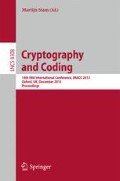Abstract
Given an irreducible non-primitive polynomial g of degree n over \(\mathbb{F}_{2}[x]\) we aim to compute in parallel all the elementary sequences with minimal polynomial g (i.e. one sequence from each class of equivalence under cyclic shifts). Moreover, they need to each be in a suitable phase such that interleaving them will produce an m-sequence with linear complexity deg(g); this m-sequence is therefore produced at the rate of q = (2n − 1)/ord(g) bits per clock cycle. A naive method would use q LFSRs so our aim is to use considerably fewer. We explore two approaches: running a small number of Galois LFSRs with suitable seeds and using certain registers, possibly with a small amount of buffering; alternatively using only one (Galois or Fibonacci) LFSR and computing certain linear combinations of its registers. We ran experiments for all irreducible polynomials of degree n up to 14 and for each n we found that efficient methods exist for at least one m-sequence. A combination of the two approaches above is also described.
Access this chapter
Tax calculation will be finalised at checkout
Purchases are for personal use only
Preview
Unable to display preview. Download preview PDF.
References
Blackburn, S.R.: Increasing the Rate of Output of m-Sequences. Information Processing Letters 51(2), 73–77 (1994)
Kagaris, D.: Multiple-Seed TPG Structures. IEEE Transactions on Computers 52(12), 1633–1639 (2003)
Lempel, A., Eastman, W.L.: High speed generation of maximum length sequences. IEEE Transactions on Computers 20(2), 227–229 (1971)
Lidl, R., Niederreiter, H.: Introduction to Finite Fields and Their Applications. Cambridge University Press (1994)
MacWilliams, F.J., Sloane, N.J.A.: The Theory of Error-Correcting Codes. North-Holland (1978)
Robshaw, M.J.B.: Increasing the Rate of Output for m Sequences. Electronics Letters 27(19), 1710–1712 (1991)
Sălăgean, A., Gardner, D., Phan, R.: Index Tables of Finite Fields and Modular Golomb Rulers. In: Helleseth, T., Jedwab, J. (eds.) SETA 2012. LNCS, vol. 7280, pp. 136–147. Springer, Heidelberg (2012)
Surböck, F., Weinrichter, H.: Interlacing Properties of Shift-Register Sequences with Generator Polynomials Irreducible Over GF(p). IEEE Transactions on Information Theory 24(3), 386–389 (1978)
Udar, S., Kagaris, D.: LFSR Reseeding with Irreducible Polynomials. In: On-Line Testing Symposium, pp. 293–298 (2007)
Author information
Authors and Affiliations
Editor information
Editors and Affiliations
Rights and permissions
Copyright information
© 2013 Springer-Verlag Berlin Heidelberg
About this paper
Cite this paper
Gardner, D., Sălăgean, A., Phan, R.C.W. (2013). Efficient Generation of Elementary Sequences. In: Stam, M. (eds) Cryptography and Coding. IMACC 2013. Lecture Notes in Computer Science, vol 8308. Springer, Berlin, Heidelberg. https://doi.org/10.1007/978-3-642-45239-0_2
Download citation
DOI: https://doi.org/10.1007/978-3-642-45239-0_2
Publisher Name: Springer, Berlin, Heidelberg
Print ISBN: 978-3-642-45238-3
Online ISBN: 978-3-642-45239-0
eBook Packages: Computer ScienceComputer Science (R0)

